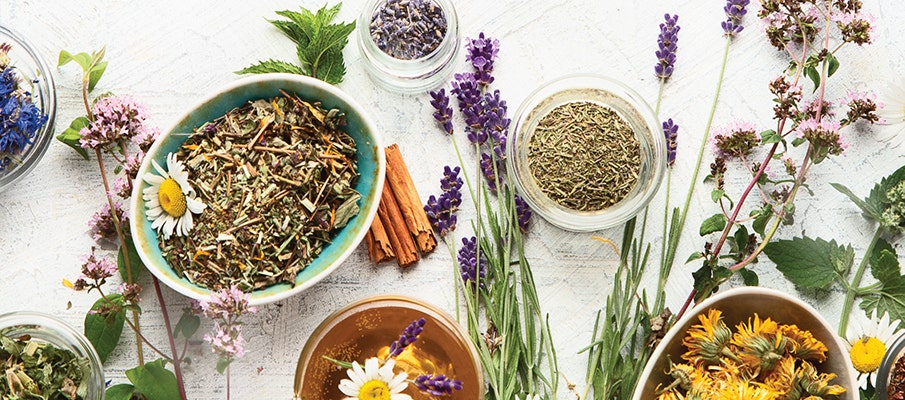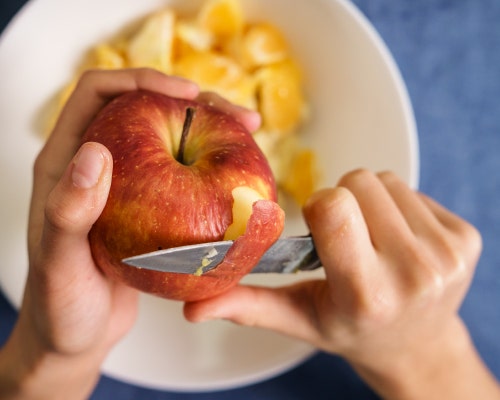Stress Management with 5 Herbs
- 11/9/23


In a fast-paced world, stress has become a constant companion for most of us. Whether it originates from our career, relationships, or other responsibilities, unmanaged and ongoing stress can take a toll on emotional, mental, and physical health.
Understanding Stress
Stress is defined as mental or emotional pressure resulting from adverse or demanding circumstances. This likely rings true if you think about the types of scenarios in which you’ve felt stressed.
Acute stress refers to a dramatic physiological reaction to an event. It’s actually key to our survival. Chronic stress refers to ongoing feelings of pressure or overwhelm over a long period. Unmanaged stress can be damaging to our health so it’s important to find ways to help alleviate it, like certain herbs.
Top Herbs for Stress Relief
When considering which herbs to try, it can be overwhelming to know where to start. We’ve taken a deeper dive into which ones are most likely to support your stress management routine.
Lavender
Lavender can be beneficial for improving mood and relaxation, particularly when used in aromatherapy. A 2022 review of 21 articles concluded that lavender significantly reduces stress and should be considered as part of stress management programs.
Chamomile
If you’re someone who enjoys a cup of chamomile tea to relax, you’ll be interested to know that research supports its benefits for stress reduction. The antioxidant properties of chamomile may be to thank.
Ashwagandha
Ashwagandha is an adaptogen, which means that it’s used to help the body adapt and respond better to stress. Some studies have found that ashwagandha may help improve sleep and reduce feelings of stress. A 2021 clinical trial among 130 healthy participants found that 90 days of daily supplementation was effective in supporting memory, focus, sleep quality, and stress.
Saffron
Saffron comes from the stigma and styles of the Crocus sativus flower. It’s been studied for its benefits on mood and stress. A 2021 clinical trial found that when given 30 mg of standardized saffron extract daily for 8 weeks, healthy adults experienced improved mood. The authors suggested that saffron may help increase resilience against stress.
Rhodiola Rosea
Another adaptogen, Rhodiola rosea has been studied for its effects on supporting resilience to stress. Some of its historical uses have been to stimulate the nervous system and help stress-induced tiredness. One 2018 review concluded that it can offer positive benefits for comprehensive stress management.
Garden of Life Herbal Stress Relief† Gummies contain saffron and Rhodiola rosea for stress and mood support. These yummy berry-flavored gummies can easily be added to your morning or evening routine.
Lifestyle Factors for Stress Reduction
In addition to natural approaches like herbs, it’s important to implement other stress management tactics, like:
- Optimal nutrition. Eat a diet based on minimally processed plant foods, including fruits, vegetables, legumes, nuts, seeds, and whole grains, and limit ultra-processed foods that are high in saturated fat, sodium, and added sugar.
- Regular exercise. Moving your body for 30-60 minutes most days benefits mental, emotional, and physical wellness. This could be a combination of things you enjoy, like swimming, jogging, and strength training.
- Meditation. When you’re under stress, a quiet moment in your body can feel challenging. Setting aside just 13 minutes a day to meditate has been proven to help.
- Good sleep hygiene. Most of us aren’t getting enough quality sleep, which is critical for stress management. Improve sleep by avoiding blue light close to bedtime, having a consistent sleep-wake cycle, and creating a sleep-promoting environment.
Herbs for Stress
If you’ve been under stress, know that you’re not alone. Many people find success in adding herbs to their stress management routine, along with other healthy lifestyle habits. If you’re interested in trying what herbs may have to offer, consider options like chamomile, lavender, valerian, ashwagandha, and Rhodiola rosea.
References
-
Kim, M., Nam, E. S., Lee, Y., & Kang, H. J. (2021). Effects of Lavender on Anxiety, Depression, and Physiological Parameters: Systematic Review and Meta-Analysis. Asian nursing research, 15(5), 279–290. https://doi.org/10.1016/j.anr.2021.11.001
-
Kang, H. J., Nam, E. S., Lee, Y., & Kim, M. (2019). How Strong is the Evidence for the Anxiolytic Efficacy of Lavender?: Systematic Review and Meta-analysis of Randomized Controlled Trials. Asian nursing research, 13(5), 295–305. https://doi.org/10.1016/j.anr.2019.11.003
-
Ghavami, T., Kazeminia, M., & Rajati, F. (2022). The effect of lavender on stress in individuals: A systematic review and meta-analysis. Complementary therapies in medicine, 68, 102832. https://doi.org/10.1016/j.ctim.2022.102832
-
Sah, A., Naseef, P. P., Kuruniyan, M. S., Jain, G. K., Zakir, F., & Aggarwal, G. (2022). A Comprehensive Study of Therapeutic Applications of Chamomile. Pharmaceuticals (Basel, Switzerland), 15(10), 1284. https://doi.org/10.3390/ph15101284
-
Salve, J., Pate, S., Debnath, K., & Langade, D. (2019). Adaptogenic and Anxiolytic Effects of Ashwagandha Root Extract in Healthy Adults: A Double-blind, Randomized, Placebo-controlled Clinical Study. Cureus, 11(12), e6466. https://doi.org/10.7759/cureus.6466
-
Gopukumar, K., Thanawala, S., Somepalli, V., Rao, T. S. S., Thamatam, V. B., & Chauhan, S. (2021). Efficacy and Safety of Ashwagandha Root Extract on Cognitive Functions in Healthy, Stressed Adults: A Randomized, Double-Blind, Placebo-Controlled Study. Evidence-based complementary and alternative medicine : eCAM, 2021, 8254344. https://doi.org/10.1155/2021/8254344
-
Jackson, P. A., Forster, J., Khan, J., Pouchieu, C., Dubreuil, S., Gaudout, D., Moras, B., Pourtau, L., Joffre, F., Vaysse, C., Bertrand, K., Abrous, H., Vauzour, D., Brossaud, J., Corcuff, J. B., Capuron, L., & Kennedy, D. O. (2021). Effects of Saffron Extract Supplementation on Mood, Well-Being, and Response to a Psychosocial Stressor in Healthy Adults: A Randomized, Double-Blind, Parallel Group, Clinical Trial. Frontiers in nutrition, 7, 606124. https://doi.org/10.3389/fnut.2020.606124
-
Ivanova Stojcheva, E., & Quintela, J. C. (2022). The Effectiveness of Rhodiola rosea L. Preparations in Alleviating Various Aspects of Life-Stress Symptoms and Stress-Induced Conditions-Encouraging Clinical Evidence. Molecules (Basel, Switzerland), 27(12), 3902. https://doi.org/10.3390/molecules27123902
-
Anghelescu, I. G., Edwards, D., Seifritz, E., & Kasper, S. (2018). Stress management and the role of Rhodiola rosea: a review. International journal of psychiatry in clinical practice, 22(4), 242–252. https://doi.org/10.1080/13651501.2017.1417442
-
Childs, E., & de Wit, H. (2014). Regular exercise is associated with emotional resilience to acute stress in healthy adults. Frontiers in physiology, 5, 161. https://doi.org/10.3389/fphys.2014.00161
-
Tosini, G., Ferguson, I., & Tsubota, K. (2016). Effects of blue light on the circadian system and eye physiology. Molecular vision, 22, 61–72.





